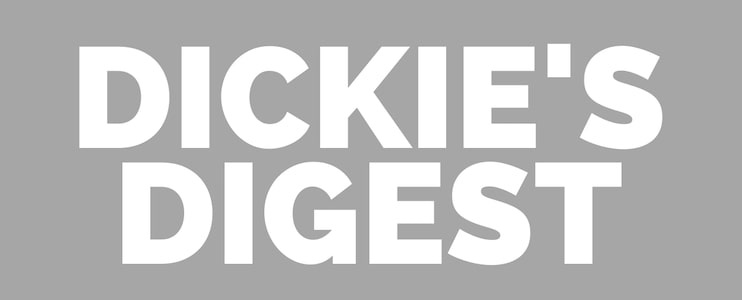Dickie's Digest #18 — Fauxductivity, Bill Ackman, and Unsolicited Advice
Hi there 👋🏻👋🏻
Welcome to May! 2020 is now 33% complete but most everyone is 100% over it.
In this week’s Digest, I am looking for some advice. At the bottom of the “Something I’m Thinking About” section, I ask a question for which I’m struggling to find an answer. If you give that section a read and have some thoughts, you can respond directly to this email. I’ll aggregate the answers and share them with everyone who responds.
Also, the podcast and articles included this week are some of the best of the year.
As always, be sure to bookmark this email and come back if you can't get through everything today. If you come across anything during the week that's worth sharing, send it my way. Enjoy!
If you find something worthwhile in here each week and know someone else who might too, give that button a tap and share it with them!
Something I’m Thinking About — Fauxductivity and Procrastination
This week I rewatched a video that fundamentally changed the way I understood procrastination. The video is linked below and here are the associated articles:
If you’ve never seen this video before, watch it today. Seriously.
To try and summarize a Tim Urban idea in a few sentences is exceptionally difficult, but I’ll give it a shot: in order to overcome procrastination, the Rational Decision-Maker must drag the Instant Gratification Monkey out of the Dark Playground, into the Critical Entrance, past the Tipping Point, and into the Happy Playground. Only then can we fend off the Panic Monster and reach Flow. See what I mean? Not easy. To better understand, watch the video or read Part 1 and Part 2.

Since I first heard that Ted Talk, my work habits have changed. Back then, my problem was getting to work. Instead of working, I would watch endless Vine clips, scroll through 7th-grade Facebook photos, or reorganize my bookshelf. Now, my problem is not getting to work, it’s doing work that matters. I no longer actively avoid working on something, but many of my tasks are somewhat Fauxductive. Fauxductive actions are those tasks that feel productive but are not moving the needle. Examples include responding to every email promptly, reorganizing and rewriting my to-do list, or reading useless articles and calling it “research.” These actions feel like work, but they’re easy to do and don’t require much thinking. Recognizing when I’m engaging in these fauxductive tasks instead of doing real work has proven difficult.
I write this first to introduce anyone who struggles with genuine procrastination to Tim Urban’s video and articles. Tim’s explanation helped me better understand how and why I struggled to get to work and how to deal with it. But my second reason is to ask the question and seek advice:
Do you struggle with fauxductivity, procrastination, or both? How do you focus on work that moves the needle and avoid work that doesn't? When there are three or four projects you could work on at any moment, how do you decide which one to work on?
If you feel like sharing your ideas, you can respond directly to this email! If I get enough responses, I’ll aggregate and share them with everyone who answers.
Audio To Hear
Dickie’s Digest Podcast Playlist
Every podcast I find worthwhile makes its way into the playlist linked here, which you can follow on Spotify. This week there were several worth listening and re-listening to:
BEST OF THE WEEK
Bill Ackman: Getting Back Up | The Knowledge Project — In this interview, Shane Parrish sits down with Bill Ackman, CEO of Pershing Square Capital Management. Ackman has been the subject of much discussion after his foresight into the impact of COVID-19 lead him to a 2.6 billion-dollar big short. In the midst of the March stock market meltdown, Ackman gave this emotional, alarmist interview on CNBC, calling for President Trump to shut the country down. Skeptics believe he was trying to manipulate the markets to the benefit of his short bets, which he goes on to address in the interview. Bill and Shane also discuss dealing with failure, learning from experience, the importance of habits and routines, and the influence of Warren Buffet. I highly recommend this episode.
“I’ve always had this view that success is not a straight line up. If you read the stories of successful people, almost every successful person has had to deal with some degree of hardship, whether that hardship is personal hardship, health-related hardship, or a business issue.”
“I’ve always had the view that how successful you are is really a function of how you deal with failure. If you deal with failure well and you persist, you have a high probability of being successful.”
Ackman also stars in the best video on the basics of business and investing, which you can find here and is linked below. This video condenses an entire textbook into an hour-long video, perfect for anyone looking to get a surface-level understanding.
RUNNER-UPS
Peter Zeihan Explains the Geopolitical Landscape | The Pomp Podcast — Peter Zeihan discusses how demographics drive economies, why consumption-led growth will become impossible, what is happening in the oil markets, why Peter believes China won't be a unified or industrialized country in a decade, how a virus can lead to famine, and what is happening in various places around the world
Jack Dorsey: Square, Cryptocurrency, and Artificial Intelligence — Jack Dorsey discusses Square and global access to the economy, Bitcoin as the native currency of the internet, how Twitter and Square are using artificial intelligence, why he walks 10 miles and eats one meal a day, and his thoughts on the meaning of life.
Articles To Read
68 Bits of Unsolicited Advice | Kevin Kelly — Kevin Kelly, the fascinating and thoughtful founder of Wired, presents 68 small bits of wisdom that touch on every bit of life. Each bullet point is an entire book’s worth of wisdom boiled down to a few words— all signal, no noise. A few of my favorites:
“Being enthustiastic is worth 25 IQ Points”
“Before you are old, attend as many funerals as you can bear, and listen. Nobody talks about the departed’s achievements. The only thing people will remember is what kind of person you were while you were achieving.”
“To make mistakes is human. To own your mistakes is divine. Nothing elevates a person higher than quickly admitting and taking personal responsibility for the mistakes you make and then fixing them fairly. If you mess up, fess up. It’s astounding how powerful this ownership is.”
“Don’t be the best. Be the only.”
Best of Twitter

End Note
If you’re enjoying the Digest so far, I’d love it if you shared it with a friend or two by forwarding it or sharing it with the button below!
Be sure to follow me on Twitter or respond directly to this email to get in touch. And should you come across anything interesting this week, send it my way! I love finding new things to read through members of this newsletter.
Have an epic week,
Dickie








